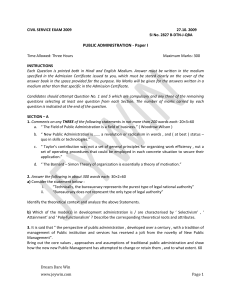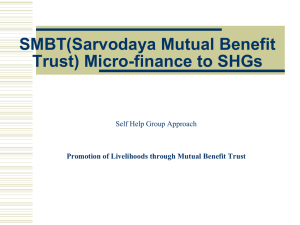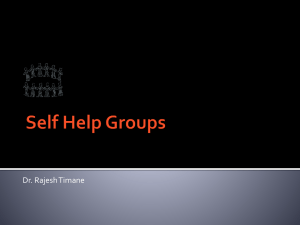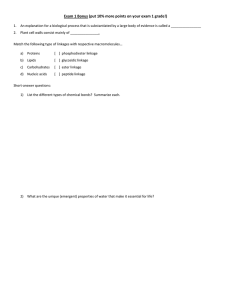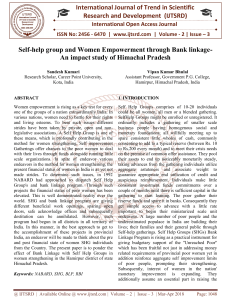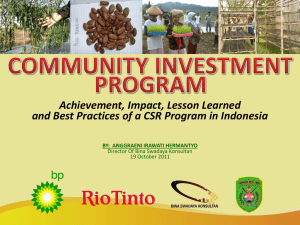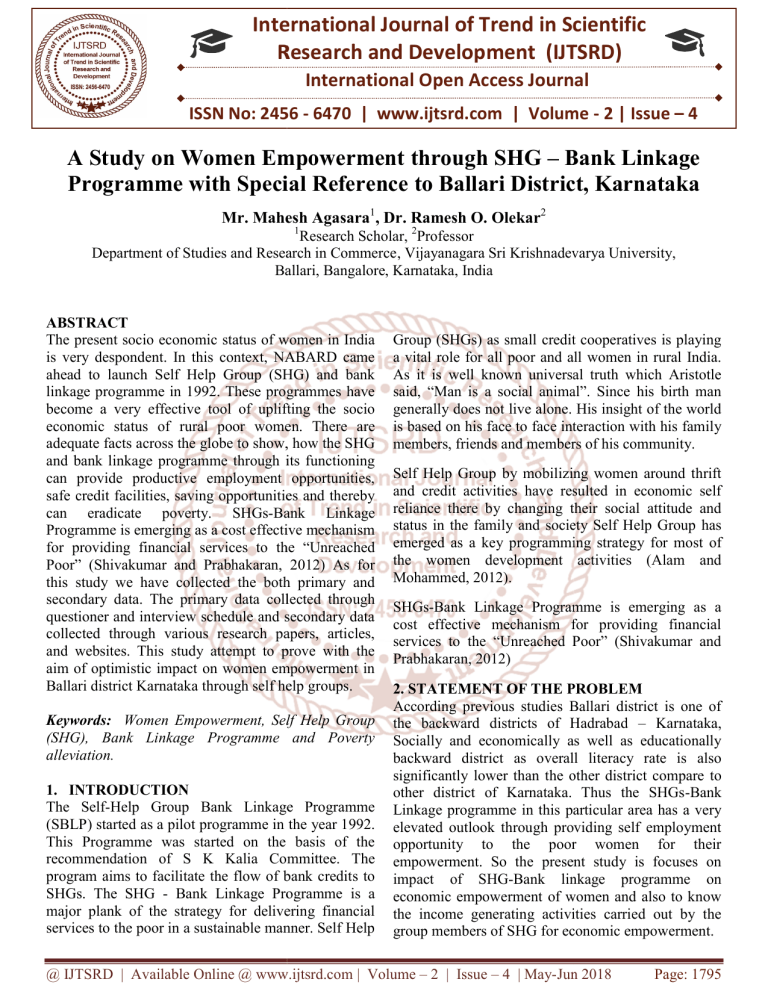
International Journal of Trend in Scientific
Research and Development (IJTSRD)
International Open Access Journal
ISSN No: 2456 - 6470 | www.ijtsrd.com | Volume - 2 | Issue – 4
A Study on
n Women Empowerment through SHG – Bank Linkage
Programme with
ith Special Reference to Ballari District, Karnataka
Mr. Mahesh Agasara1, Dr. Ramesh O. Olekar2
1
Research Scholar, 2Professor
Department of Studies and Research in Commerce
Commerce, Vijayanagara Sri Krishnadevarya University,
Ballari
Ballari, Bangalore, Karnataka, India
ABSTRACT
The present socio economic status of women in India
is very despondent. In this context, NABARD came
ahead to launch Self Help Group (SHG) and bank
linkage programme in 1992. These programmes have
become a very effective tool of uplifting the socio
economic status of rural poor wome
women. There are
adequate facts across the globe to show, how the SHG
and bank linkage programme through its functioning
can provide productive employment opportunities,
safe credit facilities, saving opportunities and thereby
can eradicate poverty. SHGs-Bank
Bank Linkage
Programme is emerging as a cost effective mechanism
for providing financial services to the “Unreached
Poor” (Shivakumar and Prabhakaran, 2012) As for
this study we have collected the both primary and
secondary data. The primary data collected thro
through
questioner and interview schedule and secondary data
collected through various research papers, articles,
and websites. This study attempt to prove with the
aim of optimistic impact on women empowerment in
Ballari district Karnataka through self help ggroups.
Keywords: Women Empowerment, Self Help Group
(SHG), Bank Linkage Programme and Poverty
alleviation.
1. INTRODUCTION
The Self-Help
Help Group Bank Linkage Programme
(SBLP) started as a pilot programme in the year 1992.
This Programme was started on the basis of the
recommendation of S K Kalia Committee. The
program aims to facilitate the flow of bank credits to
SHGs. The SHG - Bank Linkage Programme is a
major plank of the strategy for delivering financial
services to the poor in a sustainable manner. Self Help
Group (SHGs) as small credit cooperatives is playing
a vital role for all poor and all women in rural India.
As it is well known universal truth which Aristotle
said, “Man is a social animal”. Since his birth man
generally does not live alone. His insight of the world
is based on his face to face interaction with his family
members, friends and members of his community.
Self Help Group by mobilizing women around thrift
and credit activities have resulted in economic self
reliance there by changing their social attitude and
status in the family and society Self Help Group has
emerged as a key programming strategy for most of
the women development activities (Alam and
Mohammed, 2012).
SHGs-Bank
Bank Linkage Programme is emerging as a
cost effective mechanism for providing financial
services to the “Unreached Poor” (Shivakumar and
Prabhakaran, 2012)
2. STATEMENT OF THE PROBLEM
According previous studies Ballari district is one of
the backward districts of Hadrabad – Karnataka,
Socially and economically as well as educationally
backward district as overall literacy rate is also
significantly lower than the other district compare to
other district of Karnataka. Thus the SHGs-Bank
SHGs
Linkage programme in this particular area has a very
elevated outlook through providing self employment
opportunity to the poor women for their
empowerment. So the present study is focuses on
impact of SHG-Bank
Bank linkage programme on
economic empowerment of women and also to know
the income generating activities carried out by the
group members of SHG for economic empowerment.
@ IJTSRD | Available Online @ www.ijtsrd.com | Volume – 2 | Issue – 4 | May-Jun
Jun 2018
Page: 1795
International Journal of Trend in Scientific Research and Development (IJTSRD) ISSN: 2456-6470
3. OBJECTIVES OF THE STUDY
To know the income generating activities carried
out by the group members of SHG for economic
empowerment.
To examine the impact of SHG-Bank linkage
programme on economic empowerment of women
in study area.
4. Methodology and Data collection
The study fallows descriptive research method. The
main objective of the study is describing the role
played by SHGs-Bank Linkage programme in women
empowerment by providing them financial protection.
4.1 Data Collection
This study is mainly based on Primary data and as
well as Secondary data. Primary data is collected from
the women members of the selected SHGs with the
help of questionnaire through survey method using
personal interview schedule. The secondary data is
collected with the help of Books, Magazines,
Newspapers, Research Articles, Research Journals, EJournals, etc.
4.2 Sampling and Sample Size:
The study is conducted in Ballari District of
Karnataka through field survey to get an insight of the
benefits and challenges faced by women in SHGs. A
sample of 35 SHGs from 7 taluka’s has been selected
from Ballari District, and five SHGs from each
Taluka has been randomly selected. And information
has been collected from 150 women respondents from
the selected study area. Hence the study is based on
multi stage sampling.
4.3 Tools and Techniques:
The data collected for the selected 35 SHGs are
represented and interpreted through statistical tables
and used percentage method for analysing the data.
5. ANALYSIS AND INTERPRETATION
Table 5.1: Analysis about the Age Group of
the Respondents
Age Group
Number of
Percentage
(in years)
Respondents
(%)
Below 20
20-30
30-40
40-50
Above 50
TOTAL
10
44
54
38
4
150
6.66
29.33
36.00
25.33
2.66
100
From the above table it is clear that majority 36.00%
of the respondents are from the age group of 30-40,
followed by 29.33% in the age group of 20-30 and
25.33 percent in the age group of 40-50. However it
can be noticed from the table that SHGs-Bank
Linkage programme is not aware of women members
in the age group of below 20 and above 50. It anxious
that SHGs-Bank Linkage programme is unable to
intention the senior women. And women are
economically insecure.
Table- 5.2: Analysis about the Marital
Status of the Women Respondent
Marital
Number of Percentage
Status
Respondents
(%)
Married
114
76
Unmarried
27
18
Widow
6
4
Divorced
3
2
TOTAL
150
100
From the above table it is evident that SHGs Bank
Linkage programmes are playing vital role in the
direction of economic improvement of married
women. Majority of the respondents 76% are married
and 18.00 percent of the respondents are yet to get
married. And 4 % of the respondents belong to widow
and reaming 2% is divorced women.
Table- 5.3: Analysis about the Impact of
SHGs-Bank Linkage Programme on Income Level
of the Respondent
Estimation Number of Percentage (%)
Respondents
Yes
108
72
Not Aware 42
30
TOTAL
150
100
The above table reveals that SHGs have brought much
improvement in the income level of the respondents.
Majority 72% of the respondents are replied that they
have enjoyed increase in their income level after
joining SHGs. However 30% percent of respondents
revealed that they are waiting to realize the impact of
SHG-Bank Linkage programme on their income level.
@ IJTSRD | Available Online @ www.ijtsrd.com | Volume – 2 | Issue – 4 | May-Jun 2018
Page: 1796
International Journal of Trend in Scientific Research and Development (IJTSRD) ISSN: 2456-6470
2456
Particulars
Before
joining
SHG
After
joining
SHG
Table- 5.4: Analysis about the Monthly Saving of the Respondents
< 500
500100020003000>4000 Total Percentage
1000
2000
3000
4000
(%)
89
23
15
59.33% 15.33% 10%
28
18
18.67% 12%
12
8%
52
26
11
34.67% 17.33% 7.33%
From the above table it is clear that after joining
SHGs the range of the amount savings of women is
increasing as it is comparing to before joining SHGs.
15.34% of the respondents before joining SHGs
saving the amount in the range between 2000 to above
4000 and 34.66% of the respondents, after joining the
SHGs saving for the same range. 38% of the
respondent before joining SHGs saving the amount in
range between 500 – 2000 and 70% of the
respondents after joining the SHGs
Gs saving for the
same range. The amount saving below 500 after
joining SHG is decreased as they involved in the
income generation activities and this shows the
benefits for women joining SHGs. The majority of the
women respondent’s monthly savings increas
increased as
they joined SHGs.
Table- 5.5: Analysis about Frequency of Taking
Loan from SHG Account
No of time taken loan
No of
Percentage
from SHG account
Respondents
(%)
One time
Two time
Three time
Four Times
More
than
Times
None
TOTAL
39
62
34
5
Four 3
7
150
7
4.67%
26
41.33
22.67
3.33
2
4.67
100
The above table shows that 26% of the respondents
are take loan for one time from the SHGs. Further
41.33%, 22.67%, 3.33%, and 2% of the respondents
are taken loan for two times, three times and four
times respectively. 4.67% of the respondents are not
taken any loan from SHGs. Majority of the
respondents are taken two times from SHGs.
4
2.67%
150
100
15
10%
150
100
Table- 5.6: Analysis about the SHGs on the basis of
Economic Activities
Economic
No of
Percentage
Activities
Respondents
(%)
Sewing machines
Kirana Shop
Embroidery
Works
Pickles
Handlooms
Beautician
Sheep/ Goat
Marriage
Total
35
30
22
23.33
20
14.67
10
17
18
8
10
150
6.67
11.33
12
5.33
6.67
100
According to the above table, 23.33% of SHG
members involved in Sewing machines work. And
20% beneficiaries have opted Kirana Shop as their
key activity. The lowest percentage 5.33 % of SHGs
has adopted Sheep/ Goat,, The percentage of other
activities are- weaving embroidery 14.67%,
Handlooms product 11.33%, and Pickles 12%.
Whereas 6.67 % respondents have taken loans for
purpose of marriage for their daughters.
6. FINDING AND SUGGESTIONS
The largely impact of SHG bank linkage
programme on SHG member household
hous
reflects
that the tendency of saving increases with the
result of implementation of programme. Apart
from that the house hold members also feels that
funding for their small business and development
of their small micro business.
There is a significant
nt change in socio economic
condition of rural poor women resulted their
living standard, capacity to work and status in
society by and large have a movement towards
positive path.
@ IJTSRD | Available Online @ www.ijtsrd.com | Volume – 2 | Issue – 4 | May-Jun
Jun 2018
Page: 1797
International Journal of Trend in Scientific Research and Development (IJTSRD) ISSN: 2456-6470
The cultured unemployed women should also be
encouraged to participate in the programme. And
senior women should also be encouraged to
participate in the programme and they get good
knowledge of creation varied kind of belongings.
However the area of their business and try to
reach to local markets to their home making
products.
The Self Help Groups will provides credit
Facilitates to the group members they will
improve their socio-economic conditions in their
Family.
The group members can utilize the benefits of
various government schemes so improve their
standard living and they take own decision in their
family. The government should provide suitable
initiatives for the success of SHGs-Bank Linkage
programme.
The Banks will provide better connection to Self
help groups in providing privileged amount of
bank loan.
7. CONCLUSION:
The study demonstrate with the aim of the main
reason for before and after self help group is not be
get credit, and empowering rural poor women. After
joining the self help group the women members are
economically and socially empowered. The self help
group is responsible for empowering women with the
help of promoting self reliance, self dependent, self
confident, and educating them to understand their
fundamental rights. SHGs-Bank Linkage programme
if implemented and utilize properly, and it will change
the shape of rural poor women economy of India.
Thus needed benefit of government scheme is until
now to realize. Because the programme is to achieve a
few kind of success in stipulations of income
generation for the rural poor women in India.
REFERENCE:
1. Alam, P., & Nizamuddin, M. (2012). Role of
Micro Finance and SHGs in Women
Empowerment: A Case Study of District Mewat.
International Journal of Entrepreneurship &
Business Environment Prospects , 1 (2), 94-101
2. Dey, S., & Borkakoty, N. (2013). SHGs-Bank
Linkage Programme and Financial Security of
Women: A Case Study of sapekhati Development
Block
of
Sivasagar
District.
Women
Empowerment Through Self Help Groups and
Bank Linkage Programme (pp. 102-115). Sonari:
Amguri College Journal.
3. Dey, S., Nath, L., & Kalita, P. (2014). Self Help
Group-Bank Linkage Programme as an Instrument
of Economic Upliftment of Poor Women of
Assam: A case Study of Raha Block of Nagaon
District. International Journal of Research in
Commerce, Economics and Management , 4 (2),
68-72.
4. Ghadge, S. T. (2014). A Contribution of Self help
Groups to Women Empowerment in Apshinghe
Village of Koregaon Tahsil Satara District
Maharashtra. Indian Streams Research Journal , 4
5. Kusugal, P. S. (2014). Micro Finance in India:
Process and its Progress. Indian Journal of
Applied Research , 4 (3), 92-93
6. Mohammed Nizamuddin, Dr. Perways Alam Role
of SHGs-Bank Linkage Programme in Women
Empowerment: A Block Level Study of Mewat
Haryana . International Journal of Management
and Social Sciences Research (IJMSSR) ISSN:
2319-4421 Volume 3, No. 4, March 2014
7. Singh, Y. (2013). Effect of Self Help Group in
Economic Empowerment o Rural Women in
Himachal Pradesh. Gender Studies , 1 (3), 54-61.
@ IJTSRD | Available Online @ www.ijtsrd.com | Volume – 2 | Issue – 4 | May-Jun 2018
Page: 1798

